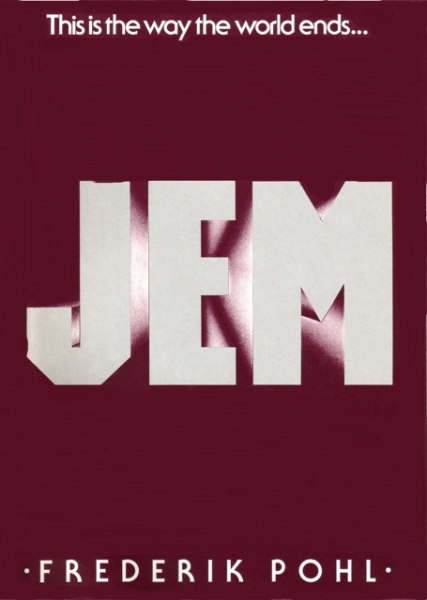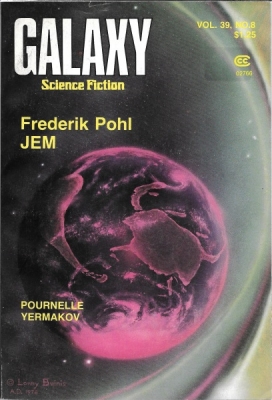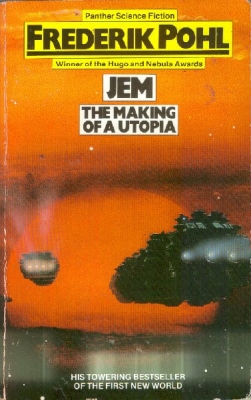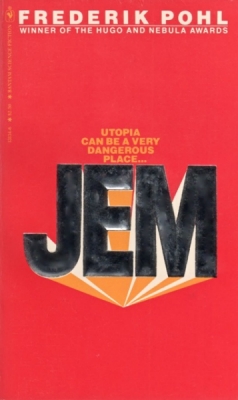The Golden Age of Science Fiction: Jem, by Frederik Pohl

The National Book Awards were established in 1936 by the American Booksellers Association. Although the Awards were not given out between 1942 and 1949 because of World War II and its aftermath, the awards were reestablished in 1950 and given out annually since then. Since 1950, only US authors are eligible for the award, which is designed to celebrate the best of American literature, expand its audience, and enhance the value of good writing in America. From 1980 through 1983, the American Book Awards were announced as a variation of the National Book Awards, run by the Academy of the American Book Awards.
While the National Book Awards were selected by a jury of writers, the TABA program relied on entry fees, committees, and voters made up of groups of publishers, booksellers, librarians, and authors and critics. The change was controversial and a group of authors including Nelson Algren, Saul Bellow, Bernard Malamud, Joyce Carol Oates, Philip Roth, and Susan Sontag, among others, called for a boycott of the award.
The American Book Award included genre categories, presenting awards for mysteries, science fiction, and westerns. Two awards were presented in the science fiction category, one for hardcover, one for paperback. The genre awards were abandoned after a single year. The only winner of the National Book Award for Hardcover Science Fiction was Frederik Pohl’s Jem. The Awards were presented in New York on May 1, 1980 at a ceremony hosted by William F. Buckley and John Chancellor. Isaac Asimov presented the science fiction awards.
I tend to find a lot of Pohl’s novels depressing, even while acknowledging he can write biting satire. His satire tends to be the darkest of humor, and Jem is certainly dark. It opens at a scientific conference held in Bulgaria in the near future, sometime after 2024. Earth has been divided into three massive alliances which are based on the products of the countries involved, The People countries that provide labor, the Oil countries that provide power, and the Food countries. Pohl introduces four individuals at the conference, Ana Dimitrova, a translator from the food bloc, her lover, Abdul Dulla, a scientist from the people countries, Danny Dalehouse, a scientist from the food countries, and Marge Menninger, a soldier from the food countries.
Abdul presents findings about a distant planet at the conference which spurs a race by all three alliances to send missions of discovery to the planet, known colloquially as Son of Kung, and later as Jem. Although there is lip-service paid to settling the world with all three blocs and eradicating the distinctions, Pohl makes it clear that such a utopia isn’t possible. As he follows the various characters on Earth and on Jem, where they are all, more or less, reunited, Pohl makes it clear that the animosities and bigotries of Earth will be carried everywhere humans travel.
In fact, along with technology and war, the one constant export from all three of the blocs is a casual bigotry. Pohl’s characters refer to each other using slurs based on both their blocs of origin as well as their ethnicity. When they arrive at Jem to discover, coincidentally enough, three apparently sentient species, each bloc allies with one of the species, or thinks they do, and immediately begin throwing around slurs for the native creatures.
While Pohl does allow his characters to explore Jem and provides some insights into some of the creatures who live there, the exploration and biodiversity of the world is not his primary interest, instead showing how shortsightedness and pettiness can get in the way of the most noble endeavor. Nevertheless, he hints at a complex world that certainly deserves better than the plot of the novel in which it is featured or the fate that is coming its way. There is a certain nihilism to the book, even as if offers up a sense of hope at the very end, but everything must be destroyed to get there.
Although published in 1979 by St. Martin’s Press, Jem was serialized in Galaxy from the November-December 1978 issue through the July 1980 issue. At the time, Galaxy was being published quite irregularly, with only three issues published in 1979 (March-April, June-July, and September-October) and one, final, issue begin published in July of 1980. John J. Pierce edited the first two issues that serialized Jem, Hank Stine edited the second two issues, and Floyd Kemske edited the final issue.
Jem was nominated in a category which included John Crowley’s Engine Summer, Thomas M. Disch’s On Wings of Song, Jerry Pournelle’s Janissaries, and Kate Wilhelm’s Juniper Time.
 Steven H Silver is a sixteen-time Hugo Award nominee and was the publisher of the Hugo-nominated fanzine Argentus as well as the editor and publisher of ISFiC Press for 8 years. He has also edited books for DAW and NESFA Press. He began publishing short fiction in 2008 and his most recently published story is “Webinar: Web Sites” in The Tangled Web. Steven has chaired the first Midwest Construction, Windycon three times, and the SFWA Nebula Conference 6 times, as well as serving as the Event Coordinator for SFWA. He was programming chair for Chicon 2000 and Vice Chair of Chicon 7.
Steven H Silver is a sixteen-time Hugo Award nominee and was the publisher of the Hugo-nominated fanzine Argentus as well as the editor and publisher of ISFiC Press for 8 years. He has also edited books for DAW and NESFA Press. He began publishing short fiction in 2008 and his most recently published story is “Webinar: Web Sites” in The Tangled Web. Steven has chaired the first Midwest Construction, Windycon three times, and the SFWA Nebula Conference 6 times, as well as serving as the Event Coordinator for SFWA. He was programming chair for Chicon 2000 and Vice Chair of Chicon 7.



This is probably my favorite Pohl novel. Yes, it’s very very dark, but to very good effect.
I’ve mentioned this before — when people talk about throwing books across the room, they usually mean in disgust at how bad the books are. JEM is the only book I’ve every literally thrown across the room — but it was in anger and despair over what a mess humanity was making of things in the novel. (That is, it was an acknowledgement of the novel’s effectiveness.)